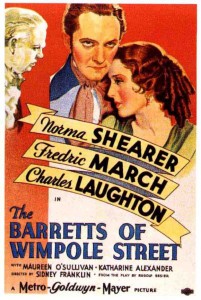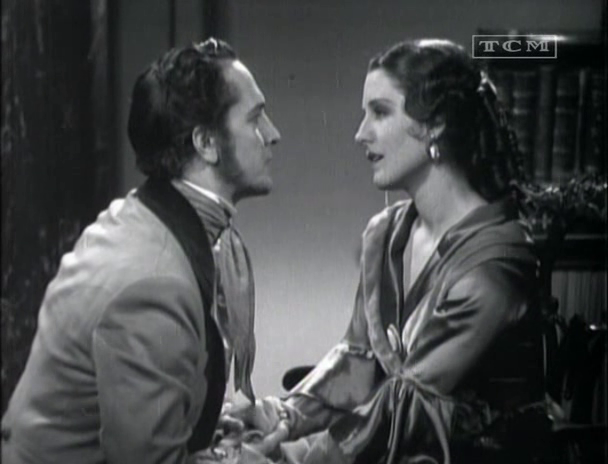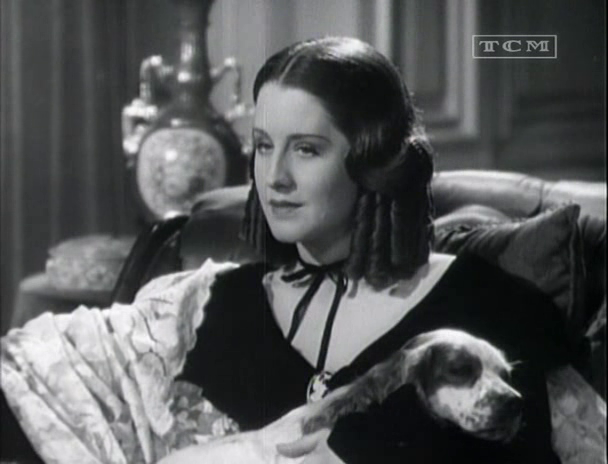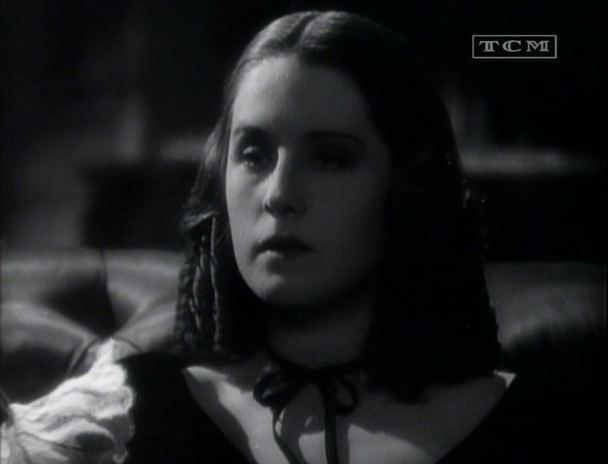“You’re everything in the world to me; you know that. Without you, I should be quite alone.”
|

Synopsis:
Bed-ridden poet Elizabeth Barrett (Norma Shearer) and her sister Henrietta (Margaret O’Sullivan) fight against the wishes of their tyrannically possessive father (Charles Laughton) in pursuing romance with their suitors — poet Robert Browning (Fredric March) and a soldier (Ralph Forbes).
|
|
Genres, Themes, Actors, and Directors:
- Charles Laughton Films
- Father and Child
- Fredric March Films
- Historical Drama
- Maureen O’Sullivan Films
- Norma Shearer Films
- Play Adaptations
- Romance
- Writers
Review:
The Barretts of Wimpole Street — based upon a 1930 play about the romance between poets Elizabeth Barrett Browning and Robert Browning — is probably best remembered these days as one of the 12 films nominated for Best Picture of the Year in 1934. It also provided Norma Shearer with one of her six Best Actress nominations, and she herself remains the primary reason to check it out: despite playing a put-upon “cripple” facing seemingly insurmountable odds in her quest for health and romance (a situation absolutely ripe for potentially cloying melodrama), Shearer’s performance is never less than fully nuanced and authentically sympathetic. The film itself (directed by Sidney Franklin, who also helmed a nearly identical remake in the 1950s with Jennifer Jones) is overly stagy but provides a surprisingly creepy depiction of parental favoritism and warped paternal despotism. Despite being just a few years older than Shearer in real life, Laughton convincingly plays her emotionally incestuous father — a man determined to keep his beloved daughter permanently by his side, and deny her any chance at romantic happiness; however, Laughton is so naturally adept at playing a creepy baddy that one can’t help wishing for an even more nuanced interpretation on his part. Meanwhile, March is suitably bold (if undistinguished) as Browning; he apparently regretted not doing even more with this role.

Redeeming Qualities and Moments:
- Norma Shearer as Elizabeth Barrett (nominated by Peary as one of the Best Actresses of the Year in his Alternate Oscars)

- A creepy look at an emotionally incestuous father-daughter relationship

- William Daniels’ atmospheric cinematography

Must See?
Yes, simply for Shearer’s lovely performance. Listed as a Personal Recommendation in the back of Peary’s book.
Categories
- Noteworthy Performance(s)
- Oscar Winner or Nominee
Links:
|





One thought on “Barretts of Wimpole Street, The (1934)”
First viewing. Not must-see.
A dated film – one which, to enough of a degree, labors under the kind of exaggerated acting style often favored (esp. by MGM) in the early ’30s. It would be interesting to know how accurately the writers captured the way people talked in the mid-1800s. But, even if it’s quite accurate, time has not been all that kind to this film.
The dialogue isn’t the only troublesome issue. The story is quite thin. Why are two hours needed to state and re-state and re-state that father is an ogre? That’s the extent of the plot; it starts where it ends, except that one child breaks free. Since very little actually happens, and what happens is repetitive, the film makes for a long haul.
Of course, generally speaking, at the time of the original play and this film, audiences and critics were very receptive to it. It was a type of period piece that held prestige. However, according to Wikipedia: Variety called it “truly an actor’s picture” with a “final stretch that grips and holds”, but [stated] overall it was “slow” and “talky” and suggested its running time could have been shortened.
Personally, I’m not a huge Shearer fan, as I detect a certain sameness in most of her performances (so they don’t allow much by way of surprise). In that sense, her work is similar to that of Miriam Hopkins, with an emphasis on affectation rather than acting. The earlier performances of Katherine Hepburn are hampered for the same reason – but Hepburn grew out of it, realizing somehow that an acting style of the past belonged there.
In Shearer’s defense, however, she succeeds here a bit more than usual – esp. in the few scenes in which she must confront Laughton directly. Those scenes have a detectable power that the film otherwise lacks. As for Laughton…it is said that he was disappointed when he learned he had not been nominated for an Oscar for this performance – it’s surprising that he should think that. As written, the father is a one-note role – and, even though his words change slightly, he might as well be saying the exact same sentence over and over and over again. There is very little for an actor to actually play.
But, then, the same holds true for most of the rest of the cast. Perhaps that’s why the performance I prefer here is the one by Una O’Connor, as the housekeeper Wilson. She serves as a kind of relief from whatever else is going on.